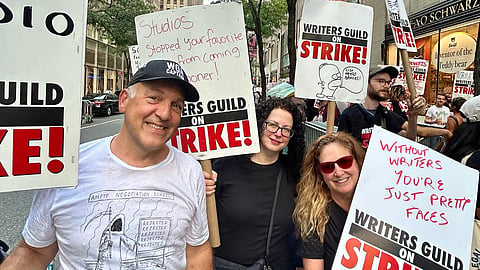

Ending a protest that lasted more than 148 days, the Writers Guild of America (WGA) has called off its strike against Hollywood studios and streaming platforms after reaching a historic but tentative agreement. The agreement, if ratified, will ensure an increase in the Minimum Basic Agreement (MBA) — the collective agreement covering the benefits, rights and protections of the work done by WGA members, an increase in the health and pension contributions, a strong regulation on the use of Artificial Intelligence, an increase in residuals, increase in pay for serial writers, flat deals for writers working on projects yet to be greenlit, and more.
In a statement, the Guild said, “The WGA reached a tentative agreement with Alliance of Motion Pictures and Television Producers (AMPTP) on a new three-year MBA … Now that we have finalized the Memorandum of Agreement, we can share details of this exceptional deal, with gains and protections for members in every sector of the business.”
The strike, which began on May 2, was called against AMPTP — an alliance body representing major film and TV studios in Hollywood — after negotiation attempts failed. At the time, the writers had stated that the residuals (financial compensation for actors, directors and others involved in a TV show or a movie from reruns, DVD sales or from streaming platforms) taken by AMPTP has resulted in lower pay for writers. The writers also wanted Artificial Intelligence (AI) tools like ChatGPT to only facilitate the writing process and not replace them.
The tentative agreement reached with AMPTP, will ensure that there is an increase of 3.5% to 5% in the MBA. For feature length streaming-service projects, an 18% increase in initial compensation has been negotiated if the budget is 30 million USD or more along with a 26% increase in residuals.
According to the WGA statement, a new residual based on viewership has been negotiated. High-budget series and films made for streaming that are viewed by 20% or more of the service’s domestic subscribers in the first 90 days of release, or in the first 90 days of the subsequent exhibition year, get a bonus equal to 50% of the fixed domestic and foreign residual, with views calculated as hours streamed domestically of the season or film divided by runtime.
The tentative agreement further ensures the terms of flat deals with writers. The deal says 50% of the fee will be paid upon commencement of the project, 25% will be paid nine weeks later, and the remaining 25% when the script is delivered. For staff writers, story editors and executive story editors, an increased weekly pay of 3.5 to 5% has also been negotiated.
The agreement regarding the use of AI will be particularly significant if ratified, and WGA says that the AMPTP has agreed to “regulate use of artificial intelligence on MBA-covered projects: AI-generated written material is not considered literary material, source material or assigned material under the MBA. AI is not a writer under the MBA. Writers can elect to use AI when performing writing services, if Company consents and provided the writer follows applicable company policies.” Further, companies cannot require writers to use AI software such as ChatGPT. Moreover, if any material given to a writer has been generated by AI or incorporates AI-generated material, the company must inform them beforehand.
This development may influence negotiations by the Screen Actors Guild and the American Federation of Television and Radio Artists (SAG-AFTRA) who are also striking. SAG-AFTRA members, who went on strike in July against AMPTP, have been demanding guarantees that AI generated faces and voice tools will not replace actors and voiceover artists. Further, similar to the WGA, they have also asked for better wage and working conditions, increase in residuals, health and pension benefits.
The WGA’s tentative agreement with AMPTP was reached on September 26 after the Negotiating Committee, the WGA West and WGA East, unanimously voted in its favour. The agreement will now go to vote among the guild membership. Eligible voters will be able to vote from October 2 through October 9. The agreement will be ratified based on the votes.